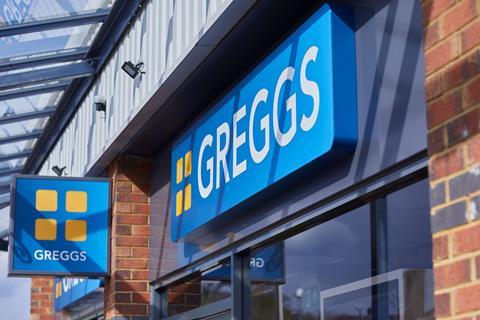
Top story
Greggs bounced back to sales growth and profitability last year as the relaxation of Covid restrictions boosted performance, but has warned costs pressures are even more significant than expected.
The food-to-go player’s total sales were a record £1.23bn in 2021 despite Covid restrictions continuing into the first quarter, a 5.3% increase on the levels seen in the pre-Covid year of 2019.
Within this, company-managed shop like-for-like sales were 3.3% lower than the equivalent period in 2019, with sales growth returning following the lifting of restrictions seen in the first quarter.
Growth came from the opening of 131 new shops opened in 2021 (with 28 closures), growing its estate to 2,181 shops trading as at 1 January 2022
From 2022, the group is targeting 150 annual net new shop openings, with the potential for at least 3,000 shops in the UK over time
Greggs is also looking to improving the quality of its estate - 200 refurbishments planned in 2022 to support growth in additional channels, while it plans to extent late opening to 500 shops in year ahead and extending delivery reach from 1,000 to 1,300 shops to complement evening availability.
Pre-tax profit for the year also bounced back to £145.6m, compared to a £13.7m loss in 2020 and a profit of £108.3m in pre-Covid 2019.
Greggs said it finished 2021 with a very strong cash position that will support its plans to invest for further growth, as well as being able to share £16.6m with its staff as part of its tradition to share 10% of its profits with employees.
In first nine weeks of 2022, like-for-like sales in company-managed shops are up 3.7% compared to the pre-Covid early 2020 level.
For same period like-for-like sales in company-managed shops up 44.2% against lockdown-affected period in 2021.
CEO Roger Whiteside commented: “Our results and achievements in 2021 show that we have emerged from the pandemic both stronger and better as a business. I would like to thank, once again, all of our teams across the country who rose so well to meet the challenges of the last two years.
“We have started 2022 well, helped by the easing of restrictions. Cost pressures are currently more significant than our initial expectations and, as ever, we will work to mitigate the impact of this on customers, however given this dynamic we do not currently expect material profit progression in the year ahead.
“Despite these near-term pressures, we continue to believe that the opportunities for Greggs have never been more exciting. Our investment over recent years has left the business well-placed to move quickly as the economy recovers and we drive our ambitious plans to become a larger, multi-channel business.”
Greggs shares have slumped 7.9% to 2,101.6p on its warning over costs.
Morning update
UK supermarket sales continued to fall in February, although NielsenIQ said the 3.4% monthly sales drop represented a stabilisation and the two-year growth rate in a “new baseline for sales growth”.
Total till sales falling -3.4% over the last four weeks ending 26th February, which is similar to figures reported the previous month, where sales fell -2.9% in January, according to monthly market share figures from NielsenIQ.
Brits spent £9.7bn at the grocery multiples over the last four weeks, down -4.2% compared with last year. But there is a 4.4% uplift in sales compared with pre-covid levels two years ago, which “indicates there is now a new baseline for sales growth”.
Moreover, as shopping behaviour normalises, industry spend per visit is stabilising at £18.502, compared to £21.10 this time last year and is now close to the £17.20 of February 2020, further suggesting the end of COVID-19 trendlines.
Nielsen found that the online share of all FMCG sales fell back to 12.5% in the last four week period (from 13.1% in January), with sales down 20% compared with the same period last year. In contrast, visits to stores are up 12% which is helping to support ‘brick and mortar’ growth (+0%), and sales in convenience channels also continue to improve (+3.3%).
In terms of retailer performance, Marks & Spencer was the fastest growing retailer over the last 12 weeks (+12.2%).
Discounters Lidl (+8.6%) and Aldi (+6.1%) also experienced growth and attracted new shoppers due to new store openings.
Tesco was the best performing of the big four, with sales down 1.5%, compared to a 3.7% fall at Sainsbury’s, 4.8% at Asda and 7.7% at Morrisons.
Mike Watkins, NielsenIQ’s UK head of retailer and business insight, said: “Although we are seeing a stabilisation of shopper spend, inflation at supermarkets has increased since the start of the year to +2.7%, the highest we’ve seen since September 2013. The pandemic may soon be behind us, but new threats are on the horizon. Global food supply disruption and soaring energy and fuel costs, are set to impact shopper baskets and have the potential to slow down any growth in supermarket volumes.
“With promotional spend unchanged at 20% of sales purchased, we can instead see a sharpening of pricing activity with price matches, price cuts, couponing, fuel vouchers, and comparative shopping basket advertising. Many supermarkets with a loyalty scheme have also offered differential price discounts as well as personalised offers which have the potential to drive frequency of visit as well as mitigate some of the impact of rising food prices.
“Retailers and their suppliers must be prepared for the uncertainty that lies ahead and ensure they are taking every step possible to support shoppers in balancing budgets over the next few months.”
Elsewhere, the UK saw continued overall retail sales growth in February, according to the BRC-KPMG Retail Sales Monitor, despite stormy weather and mounting inflation.
On a Total basis, sales increased by 6.7% in February, against an increase of 1% in February 2021, which was ahead of the 3-month average growth of 6.5% but worse than the 12-month average growth of 11.3%.
On a two-year basis, total retail sales grew 4.9% during February compared with the same month in 2020.
UK retail sales increased 2.7% on a Like-for-like basis from February 2021, with food sales increased up by 0.1% on a total basis over the most recent three months and down 0.3% on a like-for-like basis.
Over the three-months to February, non-food retail sales increased by 12% on a total basis and by 6.9% on a like-for-like basis. In-store sales of non-food items grew 71.2% on a total basis and 57.2% on a like-for-like basis as shoppers returned to physical retail locations.
Non-Food Online penetration rate decreased to 40.8% in February from 65.4% in February 2021. However, it was up 10.0 percentage points on the 30.8% seen at the same point in 2020.
BRC CEO Helen Dickinson commented: “February saw continued sales growth, although dampened by Storm Eunice and falling consumer confidence. Traditional try-before-you-buy products, like furniture and home accessories, as well as fashion and jewellery, continued to be the highflyers as more people returned to stores. While online sales remained down on last year, the new spending habits driven by the pandemic have settled into a new normal, particularly for non-food, with four in every ten pounds now spent online compared to three in every ten before the pandemic. Retail has driven five years’ of digital transformation in 24 tumultuous months.
“The future is looking increasingly uncertain, with current demand unlikely to be sustained. Consumer confidence, falling in recent months, will likely tumble further against the backdrop of the current geopolitical events. The cost of living will continue to spiral due to global inflation, increasing energy bills and the rise in national insurance this Spring. With households facing lower disposable income, discretionary spend will be one of the first things to feel the squeeze.”
Susan Barratt, CEO of IGD, on the food sector, commented: “Food and drink sales put in a resilient performance in February and although the market isn’t performing at the same rate as the lockdown-boosted growth of 2021, it remains elevated compared to 2020. Part of this will be down to inflation of course, which is undoubtedly playing a role, as shoppers face the fastest rise in the cost of living in 30 years.
“Against this backdrop, it’s no surprise that IGD’s Shopper Confidence Index continued its decline in February, reaching another all-time low since the index started in 2013. Anxiety among shoppers has no doubt been exacerbated by continued rising inflation, Ofgem’s confirmation that the energy price cap will increase by 54% in April and uncertainty over how Russia’s intervention in Ukraine will impact supply chains and food prices.”
Spending on essential items grew 12% in February, according to Barclaycard, largely driven by rising fuel prices and the easing of work-from-home guidance encouraging more Brits to commute.
However, consumers cut back on their weekly grocery shop amid rising inflation, with supermarket shopping seeing its lowest uplift since February 2020 despite rising by 12.9%.
The return to offices, combined with increased socialising and pent-up demand, also saw consumers increase their spend at clothing (15%) and pharmacy, health, and beauty stores (13.9%).
The travel sector, though still in decline (-13.9%), had its best month since before the pandemic, as a third of Brits (33%) say they are making more social or holiday plans for the rest of the year as restrictions ease.
Consumers are also feeling slightly less optimistic about their household finances (63%) compared to January (68%), as rising living costs continue to hamper confidence
José Carvalho, head of consumer products at Barclaycard, said: “The strong uplifts across both retail and hospitality show that the nation is keen to make the most of life following the easing of Plan B restrictions, with many Brits still purchasing treats to give themselves a boost, and making social and holiday plans for the year ahead.
“As inflation starts to have an impact on consumer confidence, we’re seeing a shift in spending habits as Brits seek more value from their purchases, particularly on supermarket shopping, which saw its smallest growth since February 2020. With energy prices rising at the start of April, we will be watching how these price-conscious behaviours evolve over the coming months.”
Ready meals and food-to-go player Bakkavor delivered “strong and resilient performance” in 2021, despite “unprecedented challenges” through the year.
The group’s reported revenue increased by 4.4% to £1.9bn, driven by the recovery in UK demand, albeit performance in the country was held back by the continuing supply chain and labour challenges that have accelerated since the summer.
Its US business continued to deliver meaningful progress with strong top-line growth, with like-for-like revenue up 31.8% and recent investments unlock capacity for further growth .
China, whilst showing good year-on-year growth, remains behind 2019 levels due to ongoing regional lockdowns meaning a slightly slower recovery .
Compared to 2019, the group delivered a 1.2% increase in like-for-like revenue.
Bakkavor said its focused and controlled approach to ramping up the business in 2021 and managing the inflationary headwinds and industry-wide disruption, has delivered significant progress in profitability in the period across all three regions.
Adjusted operating profit increased by £18.4m to £102m and adjusted operating margin increased by 70 basis points to 5.4%.
The group also spent £55.6m across its asset base, investing in factory automation in the UK and increased capacity and capabilities internationally.
It said sales volumes so far in 2022 have been “encouraging”, giving confidence in the continuation of the group’s revenue momentum through the year
“The Group is committed to mitigating the impact of significant inflationary headwinds through continued price recovery with customers, strict cost control and productivity improvements,” it stated.
Therefore, it is confident in delivering 2022 in line with market expectations.
CEO Agust Gudmundsson commented: “In 2021 we achieved meaningful financial and strategic progress against unprecedented industry challenges. We have continued to leverage our scale, category leadership, and strict focus on efficiency and cost control to emerge in a position of strength. Our outperformance, and the support we have given to our customers, suppliers and communities, would not have been possible without the exceptional efforts of all of our colleagues, for which I am incredibly proud.
“While we expect the significant inflationary pressures to persist, we have demonstrated our ability over the past 36 years to navigate such headwinds. I believe we are well-positioned to mitigate these challenges, giving us confidence in delivering on our expectations for the full year.”
Finally, Domino’s Pizza Group posted strong trading in its core UK and Ireland business, driven by increased orders and sales.
The group posted system sales of £1.5bn in 2021, up 11.2% year-on-year, with like for like sales, excluding splits, up 10.9%.
Underlying like-for-like system sales (excluding the temporary benefit of VAT) grew by 5.5%, 150 basis points higher than last year’s equivalent figure of 4%
It saw good growth in total orders during the year, up 5.5% in the year. Delivery performed well, and collections continued to recover, growing sequentially each quarter and finishing the year at 87% of 2019 levels.
Underlying UK & Ireland profit before tax was up 12.5% to £113.9m. In the year it also received a net benefit from lower Covid-19 related costs and VAT of £3.8m compared to a net cost of £5.4m last year.
Statutory profit after tax in the year was £78.3m, up £38.6m on last year, with growth in its core business and a significant reduction in costs and charges from discontinued international operations following the completion of the disposal of operations in Norway, Iceland, Sweden and Switzerland.
In 2022 underlying EBITDA and EPS are expected to be in line with current market expectations.
Trading in the first quarter has “started well”, aided by its first national price campaign for several years, made possible because of the resolution with our franchisees. Overall order count and customer acquisition continues to be positive, despite being up against a comparative quarter last year when there were strict lockdown restrictions in the UK.
It continues to expect an acceleration in underlying system sales growth (excluding the benefit of the reduced rate of VAT), largely driven by increased store openings and like-for-like growth due to the operating and capital investments associated with the franchisee resolution and continued implementation of its new strategic plan.
CEO Dominic Paul commented: “This was a transformational year for Domino’s. Our performance continues to be strong, and we have made significant progress against our strategic plan, all while delivering on our ambition to return excess capital to shareholders. None of this would have been possible without the hard work of our franchisees and my fantastic colleagues.
“There were two major milestones in the year. First, the launch of our new strategy, which is already delivering outstanding results and a better experience for our customers. Secondly, the resolution with our franchisees which has unlocked further potential within the system. Our franchisees are world class operators and the whole team is already embracing a new era of collaboration, with the system working together more closely than ever before.
“This year has started well, and we now have the right strategy and a strong senior team in place to continue to drive the business forward. We remain focussed on accelerating the sustainable growth of our system together, to deliver a better future through food people love.”
On the markets this morning, the FTSE 100 is once again volatile, but is currently up 0.1% at 6,969.2pts.
Early risers include Bakkavor, up 3.4% to 112.5p, Nichols, up 2.3% to 1396p and THG, up 1.8% to 81.5p.
Fallers, along with Greggs, include Parsley Box, down 5.7% to 25p, Coca-Cola Europacific Partners, down 4.9% to €40.53 and Domino’s Pizza Group, down 3.8% to 335.8p.
Yesterday in the City
The FTSE 100 closed down 0.4% yesterday at 6,959.5pts after initially plunging by around 3% to 6,788pts before recovering through the day.
Fallers included FeverTree, down 6.3% to 1,546.5p, Greencore, down 6.3% to 114.8p, Coca-Cola HBC, down 6% to 1,480p, Parsley Box, down 5.7% to 25p, Bakkavor, down 5.4% to 108.8p, Coca-Cola Europacific Partners, down 4.9% to €40.53, Naked Wines, down 4.8% to 363.5p, Marks & Spencer, down 4.7% to 149.9p and Diageo, down 4.6% to 160.5p.
Troubled McColl’s recovered some of its recent share price losses, rising 51.6% back to 2.35p.
Other risers included Just Eat Takeaway.com, up 2.1% to 2,346p, Nichols, up 1.9% to 1,365p, Pets at Home, up 1.5% to 352.4p and Deliveroo, up 1.5% to 108.4p.







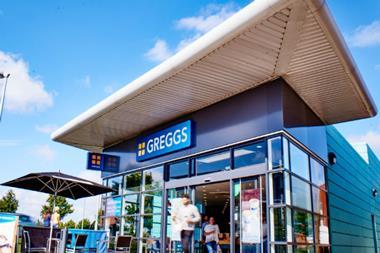
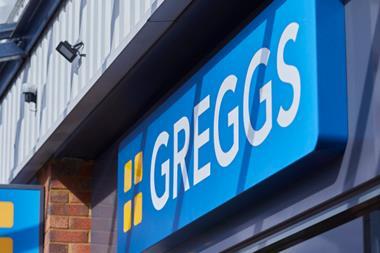
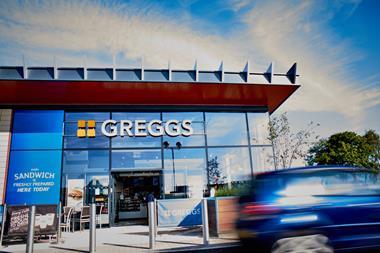
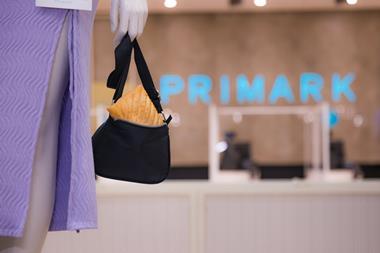
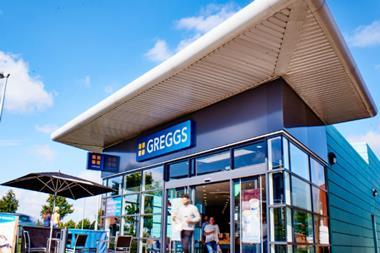
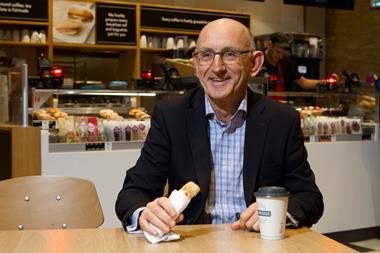


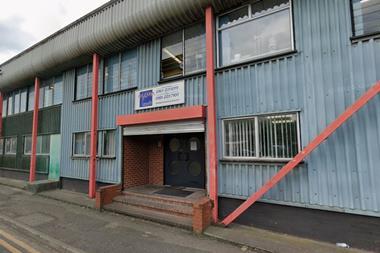
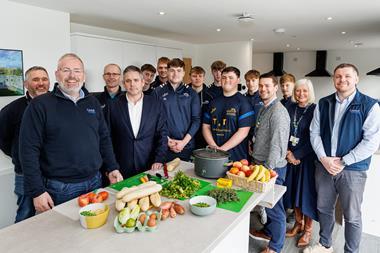

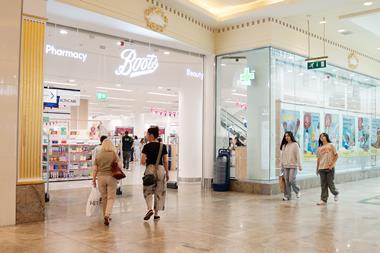
No comments yet